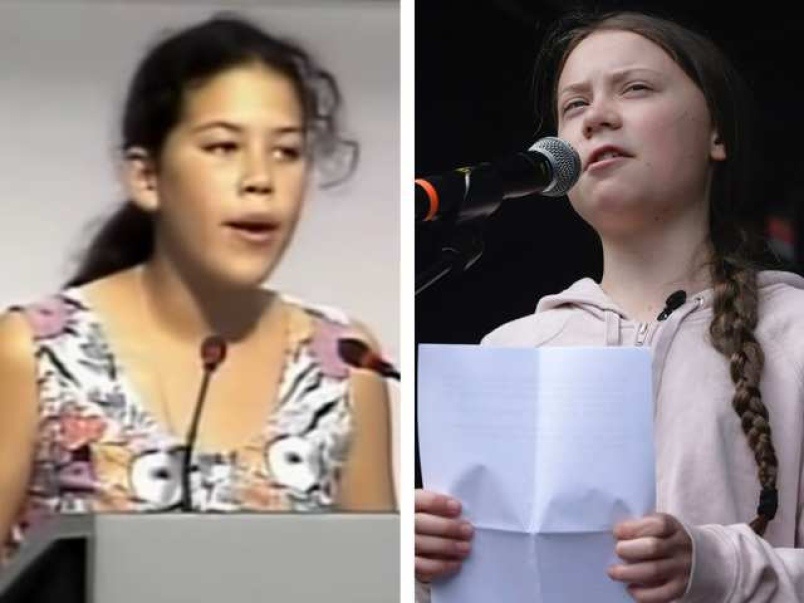Young people are more politically active now than ever before. The climate action movement sweeping across the world has created a platform for youth to have their voices heard and demand governments to prioritize tackling the climate crisis.
Whilst the movement may have started with 16-year-old student Greta Thunberg striking outside the Swedish parliament, it has gone global: it has brought millions of people to the streets to strike and march for the climate. However, Greta wasn’t the first teenager to bring attention to the fight for our future. In 1992, then 12-year-old Severn Cullis-Suzuki called out politicians and global leaders to change their ways in a speech at the Rio Earth Summit:
“Losing my future is not like losing an election or a few points on the stock market… at school, you teach us how to behave in the world. You teach us not to fight with each other. To work things out. To respect others. To clean up our mess. Not to hurt other creatures. (…) Then why do you go out and do the things you tell us not to do?”
Sometimes actions do speak louder than words, and when Greta Thunberg started striking in August of 2018, youth were ready. By March 2019, 1.4 million young people were organizing climate events, striking for climate and marching the streets. On September 20th and 27th 2019, new and old generations alike held a global strike, bringing together over 7.6 million people in 185 countries. In the United Kingdom, over 200 events took place. Only in Leeds, thousands came together with handmade posters and their voices to demand action. This week, Extinction Rebellion are shutting down streets in London and beyond to continue their demand for a global change.
Recent headlines and reports on these climate strikes don’t go along with the now common narrative that young people are politically disengaged or disinterested. This view is typically based on the voting data, which reflects a low turn-out between voters aged 18-24. We have reached a social tipping point, where young people see striking as more impactful than voting, re-enforcing the viewpoint that actions are more powerful than words or a name on a ballot.
Young people today are also more concerned about social issues and environmental degradation than economic growth when compared to previous generations. Movements like Black Lives Matter, March for Our Lives and now Fridays for Future are prime examples of calling for action through new channels such as social media campaigning. A commonality between the previously mentioned issues is that the ones engaged with fighting for a better future are young.

The continued inaction by governments when it comes to tackling the climate crisis and these social issues has led young people to lose trust in our local and global leaders. Furthermore, there is no faith in the political system itself. In a survey carried out by the European Parliament, the younger citizens reportedly saw voting as a civic duty rather than as a way to enact change.
I’m from Canada, and all I see on social media right now is post upon post of campaigns targeted towards getting the youngest electorates to vote in the current election. Being well-informed and exercising your right to vote is important, but it certainly isn’t the only way to have your voice heard.
The next question is, after all these strikes and marches, after all the political debates and voting campaigns, has the climate action movement had an impact on policy? Has it done what it was intended to do?
1,100 local governments and 20 countries, including Leeds and others areas across the rest of the UK, have declared a climate emergency, meaning they have pledged to make the environmental crisis a priority and take action. Since then, the United Kingdom has set targets to reduce all emissions to net zero by 2050, a goal that would mean balancing carbon emissions with removal through offsets.
However, climate scientists from around the world predict a rise to 1.5-2°C above pre-industrial temperature levels by 2030 if we continue with “business as usual”, as shown in the 2018 Intergovernmental Panel on Climate Change (IPCC) report. At that point, we would experience large-scale drought, famine, freshwater loss, sea level rise, flooding, increasingly severe storms, and mass ecosystem and species loss. Any rise by 1.5°C or more would be catastrophic for not only the planet, but for our species.
We need to stop burning fossil fuels, transition to renewable energy, hold big polluting corporations responsible, allow our forests to regenerate, protect our oceans, eradicate poverty and continue to demand our world leaders to act. We can’t keep pushing our environmental issues off to the next generation to fix.
The climate movement is nowhere near its end. There is still lots of work to be done. In the words of Severn, Greta, and thousands of youths all around the world, we need to continue to fight for our future.
To stay updated on climate events near you, follow Fridays for Future on social media or at https://fridaysforfuture.org/, and check out https://globalclimatestrike.net/next/ for the next global strike. See you in the streets.
Image: Times Colonist

